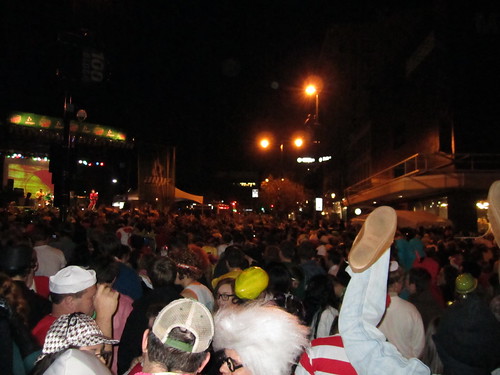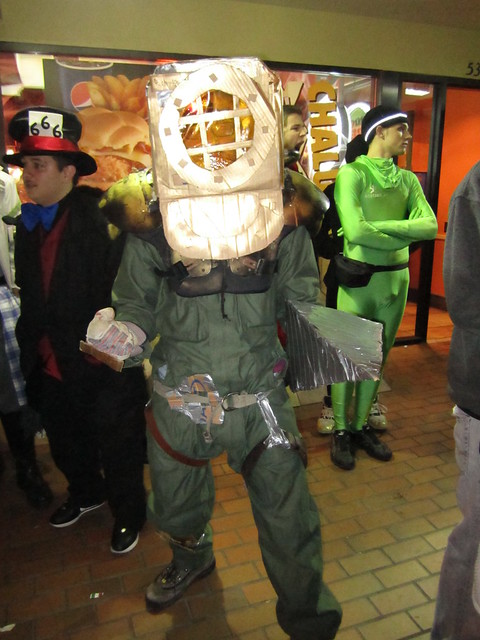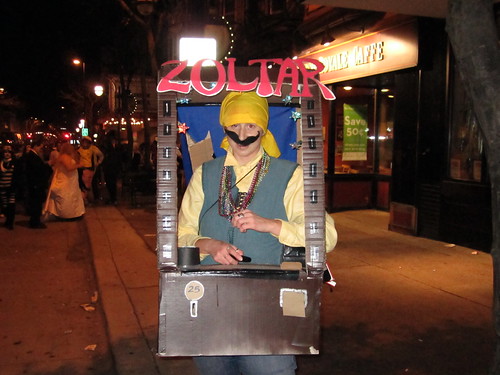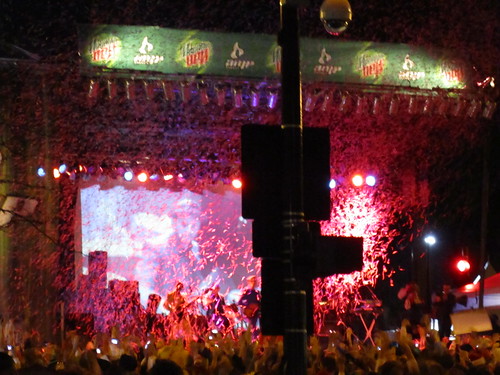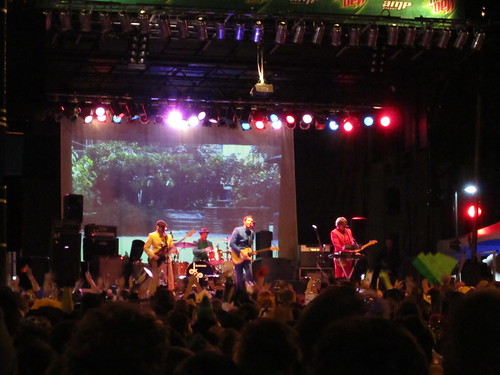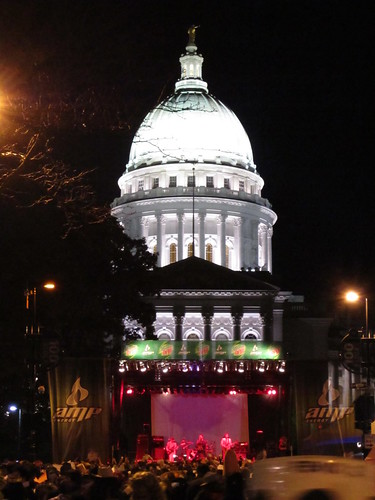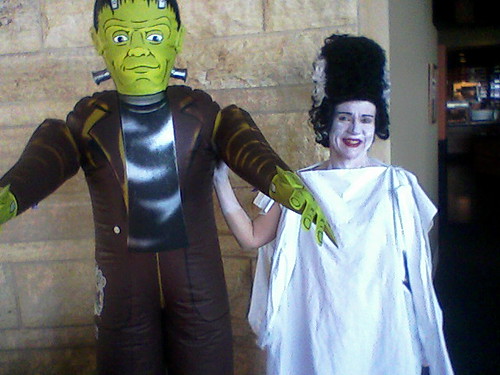Posted By John Sears on October 31, 2010
This article from NPR entitled ’8 Things Everyone Needs To Know About Zombies’ is a truly awful piece of mishmash, patently obvious trivia combined with wild speculation on fashionable topics and theories mixed with outright factual errors.
Not just errors about Zombies; errors about filmmaking, about the basic history of horror movies and the pop cultural (mis)treatment of the Differently Animated.
Let’s run down a few of the more egregious errors as we dissect the 8 things NPR wants you to believe about the Differently Animated, remotely close to true or otherwise:
#1 is just about how Zombies exist all over the world in cultural stories and myth, if you’re willing to cast a very wide net when you talk about ‘Zombies’.
#2 presents the radical idea that Dawn of the Dead, and some other zombie movies, are about capitalism and consumption.
These days, zombies are basically understood to be ghouls who consume the living. In fact, a large proportion of those who study zombies argue that they are basically a metaphor for consumption. George Romero’s Dawn of the Dead famously suggested this, showing zombies wandering through a mall in a strangely similar way to when they were humans.
If you’re under the impression that this is a thoughtful, deep critical analysis, you’ve obviously never seen the film, because Romero makes it explicit that yes, that is precisely what the zombies in his movie are representing. He does this in a slightly less than subtle way: he has his characters say so.
More than once.
[Fran and Stephen are observing from the roof of the mall]
Francine Parker: What are they doing? Why do they come here?
Stephen: Some kind of instinct. Memory, of what they used to do. This was an important place in their lives.
…
Francine Parker: They’re still here.
Stephen: They’re after us. They know we’re still in here.
Peter: They’re after the place. They don’t know why, they just remember. Remember that they want to be in here.
(quotes from IMDB)
Great catch there, NPR. *rolls eyes*
Moving on, #3 reminds us that the traditional Carribean concept/stereotype of Zombies involves slave labor, not flesh-devouring. Which is hardly news if you’ve seen, say, King of the Zombies or White Zombie (featuring Bela Lugosi no less), or any other member of the huge array of classic ‘Voodoo’ Zombie films.
#4 has this observation:
4. A Zombie Attack Is Probably The Worst Thing That Can Happen To You
The reason zombies are so terrifying to us is because they represent one of our greatest fears: a loss of our autonomy, our ability to control our bodies and minds.
Not to split hairs, but this is both an opinion and shallow. Don’t all attacks represent, by definition, a loss of control? Isn’t that the meaning of the word? If you’re in control or consenting, it’s not an ‘attack’.
#5 contains a giant load of Anti-Zombie prejudice:
5. Of All The Undead Things You Could Become, Zombies Are The Worst
As opposed to vampires, which are often represented as seductive, youthful superhuman creatures (or more recently as overly emotive teenagers), zombies are almost always cursed with an irreversible, less-than-attractive subhumanity in the single-minded pursuit of some task or thing (such as flesh or brains). With only a few imaginative exceptions, zombies cannot love, laugh or live freely.
I refuse to believe that becoming a Zombie is worse than becoming a Sparkly Vampire; this is the vilest of slanders. As for the rest, well, as we’ll see the author has actually seen or analyzed very few Zombie pop culture products, so don’t put too much stock in his notions of the rarity of empowered Zombie individuals.
6. They Have Become Fast — Because Our World Is Fast
Zombies, like LOLcats videos, have gone viral; and when things go viral, they move fast. As the themes of zombie films have shifted from Cold War worries about the slow chemical effects of radiological exposure (the source of zombie outbreaks in films like Night of the Living Dead) to terrorism-era fears about rapid bacteriological exposure (for example, in 28 Days Later or Resident Evil), the zombies have similarly accelerated. The more rapid our lives, communications, transportation and technology, the more quickly threats to them are experienced.
Wrong, wrong, wrong! I can’t begin to state how wrong this is.
Let’s start with the obvious; the Cold War, by most conceptual definitions, ends with the fall of the Soviet Union in 1991. So ‘Fast Zombies’, being creatures of the current ‘terrorism-era’, must post-date them, right?
Wrong. The movie concept of ‘Fast Zombies’, at a bare minimum, dates to 1985 which saw the release of ‘Return of the Living Dead‘ and the Argento-Bava Euro-Zom flick ‘Demons‘, both of which feature fast, highly mobile Undead creatures whose contagion is spread principally by bite and who decay while seeking human victims.
Lolcats, meanwhile, while perhaps referencing previous ‘art’ forms, date in the modern sense to 2005-2006, 20-21 years after Return of the Living Dead.
The source of the Zombie outbreak in Night of the Living Dead is also never positively identified; it’s merely speculated that the ultimate cause might be radiation from a space probe.
Neither Resident Evil nor 28 Days Later deal with bacteriological attacks; in Resident Evil it’s a series of engineered viruses used for genetic modification; in 28 Days Later, the pandemic is the result of experiments on lab animals while researching aggression and is referred to as the rage ‘virus’.
Bonus factual error: in Resident Evil, the zombies are of the slow, Romero-esque variety.
So that’s 4-5 factual errors in one paragraph!
Extra errors: this article was supposedly produced in response to AMC’s The Walking Dead, which is a modern Zombie comic cum television franchise, as well as recent books ‘World War Z’ and ‘Pride and Prejudice and Zombies’. All comtemporary, all definitely made in the ‘terrorism-era’.
Zombies, it seems, are everywhere these days — in popular books like Pride and Prejudice and Zombies and World War Z, and in the new AMC show The Walking Dead, which had the New York Times declaring that “zombies are making a comeback.”
Each and every one of them features ‘Slow Zombies’. *groan*
#7 mutilates science:
7. Oh, Yes, Zombies Are Real
Scientists have discovered and manufactured bacteria, viruses and parasites that have zombie-inducing qualities. And stem cell and nanotechnology research offer real possibilities for the reanimation of tissue.
No. No, no, no.
Stem cells do not ‘reanimate’ tissue. Stem cells are alive, and have the potential to develop into many different forms of cells. They are not some magical elixir that can bring the dead back to life.
From Wikipedia:
The two broad types of mammalian stem cells are: embryonic stem cells that are isolated from the inner cell mass of blastocysts, and adult stem cells that are found in adult tissues. In a developing embryo, stem cells can differentiate into all of the specialized embryonic tissues. In adult organisms, stem cells and progenitor cells act as a repair system for the body, replenishing specialized cells, but also maintain the normal turnover of regenerative organs, such as blood, skin, or intestinal tissues.
(emphasis mine)
I repeat, not just for NPR but also for sloppy Anti-Zombie filmmakers: stem cells do not bring back dead tissue; they REPLACE it. This is very basic science.
#8 is just some pablum about how if you retreat enough from the real world into computers you’ve somehow become a Zombie. Boring! in the 60s, they said similar things about rock and roll. In the 70s it was drugs. In the 80s it was.. I dunno, Reagan probably said welfare made you into a Zombie at some point or other. It’s odd how every generation has some new trend that terrifies their parents, and yet civilization never comes to an end, huh?
Man. I think I lost IQ points just reading that, and we didn’t even get into the vicious Living Supremacism the entire thing is predicated upon, the debasing and dehumanization of the innocent Differently Animated citizen, striving to get by in a trying and difficult world.
So shame on you, NPR, and shame on you, Jeffrey Mantz. Shame.
Category: Zombie Media |
35 Comments »
Tags: Euro-zom, Journamalism, Romero, Sparkly Vampires Suck, Videogames, What's Up with Japan?



